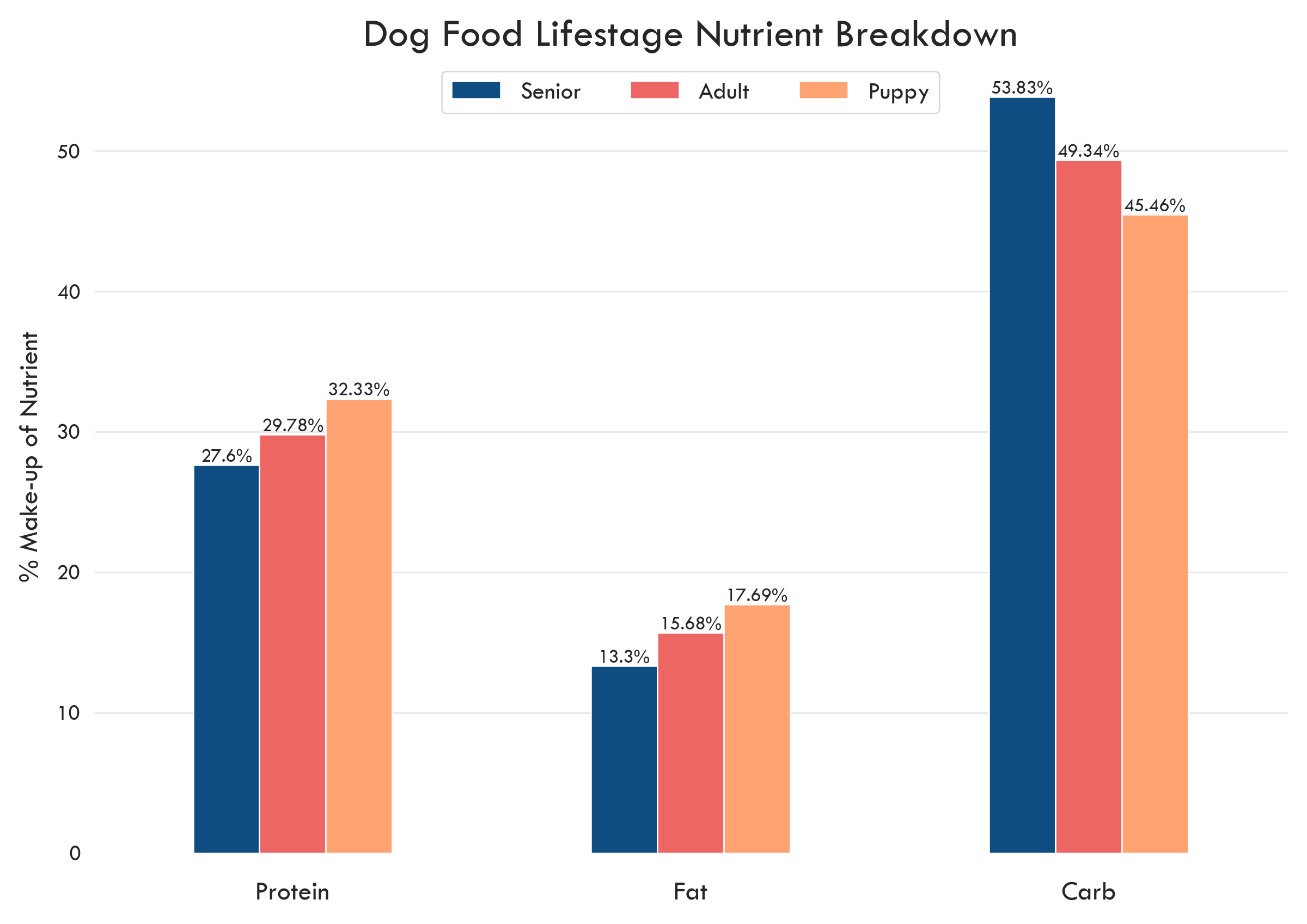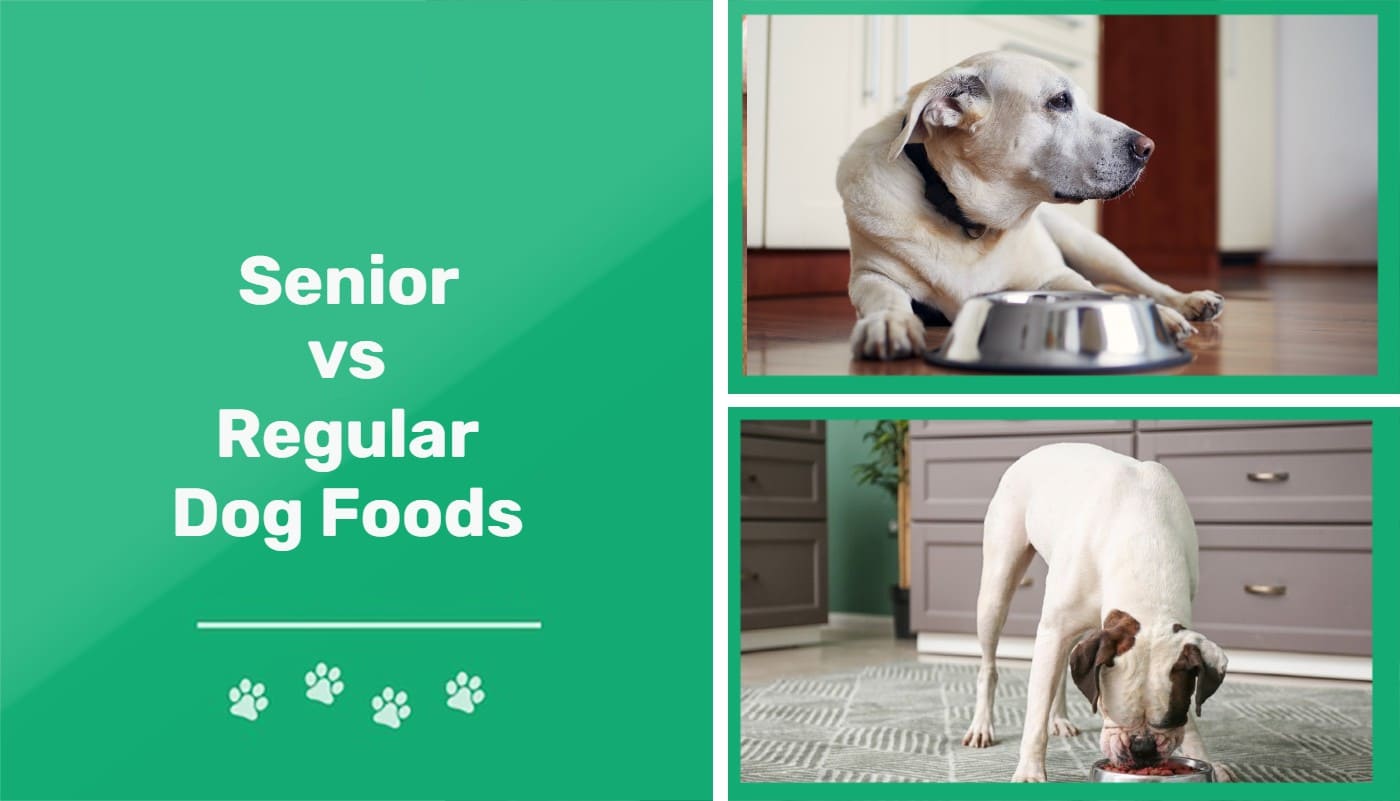As your furry friend ages, their nutritional needs change too. Senior dogs require a different diet than their younger counterparts, and this includes their food. But what exactly is the difference between senior dog food and regular dog food? Let’s dive in and find out.
Senior dog food is specially formulated to meet the changing needs of older dogs. These formulas typically have lower calorie content, higher fiber, and added supplements such as glucosamine and chondroitin to support joint health. Regular dog food, on the other hand, is designed for adult dogs of all ages and may not provide the necessary nutrients for senior dogs. Let’s explore the differences in more detail to ensure you’re providing the best nutrition for your aging pup.
Senior dog food is specifically formulated to meet the nutritional needs of older dogs. It typically contains lower calories and higher fiber to promote healthy digestion and maintain a healthy weight. It also contains more antioxidants and vitamins to support their immune system and joint health. Regular dog food, on the other hand, is designed for adult dogs and may not have the same level of nutrients required for senior dogs.

Understanding the Difference Between Senior Dog Food and Regular
Age-Appropriate Nutrition
As dogs age, their nutritional requirements change. Senior dog food is formulated to meet the specific dietary needs of older dogs. It typically has lower calories and fat, higher fiber, and more vitamins and minerals to support their aging bodies. Regular dog food, on the other hand, is meant for adult dogs who are still in their prime.
Senior dogs often have slower metabolisms, which means they need fewer calories to maintain a healthy weight. Senior dog food takes this into account and provides the necessary nutrients without excessive calories. This is important because obesity can lead to health problems such as diabetes and joint pain.
Protein Content
Protein is an essential nutrient for dogs, regardless of their age. However, the amount and type of protein in senior dog food differs from regular dog food. Senior dog food usually has less protein, but the protein is of higher quality and easier to digest. This is important because older dogs may have trouble absorbing and utilizing protein from their food.
Regular dog food, on the other hand, typically has more protein to support the growth and maintenance of muscle mass. This is particularly important for active dogs, such as working or sporting breeds, who need the extra protein to fuel their activities.
Joint Health
As dogs age, their joints can become stiff and painful. Senior dog food often contains ingredients that support joint health, such as glucosamine and chondroitin. These ingredients help to reduce inflammation and support the cartilage in the joints.
Regular dog food may not contain these ingredients, as they are not necessary for younger dogs. However, some regular dog food brands do offer specialized formulas for large breed dogs, which may contain joint-supporting ingredients.
Dental Health
Senior dogs can have dental issues such as gum disease, tooth decay, and tooth loss. Senior dog food may contain ingredients that promote dental health, such as crunchy kibble that helps to clean teeth and freshen breath.
Regular dog food may not have these dental benefits, but some brands offer dental chews or treats that can help keep teeth clean and healthy.
Overall Health Benefits of Senior Dog Food
Senior dog food has several benefits that can help support the overall health of an aging dog. These benefits include:
Overall Health Benefits of Regular Dog Food
Regular dog food also has several benefits that can help support the overall health of adult dogs. These benefits include:
Senior Dog Food vs. Regular Dog Food: Which is Better?
There is no one-size-fits-all answer to this question, as every dog is different. The best way to determine whether senior dog food or regular dog food is right for your dog is to consult with your veterinarian.
A veterinarian can help you evaluate your dog’s current health and nutritional needs and recommend a diet that will support their overall health and wellbeing. They may also recommend supplements or other treatments to address specific health concerns.
In general, if your dog is over the age of seven or is showing signs of aging, such as decreased activity levels, weight gain, or joint stiffness, it may be time to switch to a senior dog food formula. However, if your dog is still in their prime and has no health concerns, regular dog food may be appropriate.
Conclusion
In summary, senior dog food and regular dog food have different nutritional profiles to meet the specific needs of aging dogs and adult dogs, respectively. Senior dog food provides lower calories, higher fiber, and more vitamins and minerals to support aging bodies. Regular dog food provides higher protein and calories to support active lifestyles. Ultimately, the best diet for your dog will depend on their individual needs, which can be assessed by a veterinarian.
Frequently Asked Questions
As dogs age, their nutritional needs change. Senior dogs require different types of food than regular adult dogs. Here are some frequently asked questions about the difference between senior dog food and regular dog food.
What is senior dog food?
Senior dog food is specially formulated to meet the nutritional needs of older dogs. As dogs age, their metabolism slows down and they become less active, so they require fewer calories. Senior dog food is lower in calories and higher in fiber than regular dog food. It also contains a higher concentration of antioxidants, vitamins, and minerals to support the immune system and improve joint health.
Senior dog food may also include ingredients to support brain health and cognitive function, such as omega-3 fatty acids and antioxidants. Some senior dog food formulas may also be softer and easier to chew to accommodate dental issues that are common in older dogs.
What is regular dog food?
Regular dog food is formulated for adult dogs, typically between the ages of 1 and 7 years old, depending on the breed. It contains a balance of protein, fat, and carbohydrates to support energy levels and overall health. Regular dog food may also include added vitamins and minerals to support the immune system and maintain healthy skin and coat.
Regular dog food is typically higher in calories than senior dog food to meet the energy needs of adult dogs. It also contains ingredients to support muscle and bone health, such as glucosamine and chondroitin. Some regular dog food formulas may also be tailored to specific breeds or sizes of dogs to meet their unique nutritional needs.
When should I switch my dog to senior dog food?
Dogs are generally considered seniors at around 7 years old, although this can vary depending on the breed and size of the dog. It’s a good idea to start thinking about switching to senior dog food around this age, but you should consult with your veterinarian to determine the best time to make the switch based on your dog’s individual needs.
If your dog is showing signs of aging, such as decreased energy levels, joint pain, or dental issues, it may be time to switch to senior dog food. Senior dog food can help support your dog’s overall health and quality of life as they age.
Can I switch back to regular dog food after feeding my dog senior dog food?
If your dog has been eating senior dog food for a period of time but no longer needs the specialized nutrition, you can switch back to regular dog food. However, it’s important to make the transition slowly to avoid digestive upset.
Start by mixing small amounts of regular dog food into the senior dog food and gradually increase the amount over a period of several days. This will allow your dog’s digestive system to adjust to the new food and prevent any gastrointestinal issues.
Can I feed my senior dog regular dog food?
While it’s possible to feed a senior dog regular dog food, it may not provide all the necessary nutrients that they need as they age. Senior dog food is specifically formulated to meet the changing nutritional needs of older dogs, so it’s usually a better option.
If you do decide to feed your senior dog regular dog food, be sure to choose a high-quality formula that meets their nutritional needs. You may also need to adjust the serving size to account for the lower calorie content of senior dog food.

In conclusion, the difference between senior dog food and regular dog food lies in the specific nutritional needs of older dogs. As dogs age, their metabolism slows down, and they become less active. This means that they require fewer calories and more nutrients like antioxidants and joint supplements to maintain their health.
Senior dog food is formulated to meet these specific nutritional needs, with lower calorie content and higher nutrient content than regular dog food. It often contains ingredients like glucosamine and chondroitin, which help support joint health, as well as vitamins and minerals that support immune function and cognitive health.
While regular dog food may be suitable for some older dogs, it’s important to consult with a veterinarian to determine if senior dog food is necessary for your furry friend. By providing your senior dog with a diet that meets their specific nutritional needs, you can help them live a happier, healthier, and more comfortable life in their golden years.
